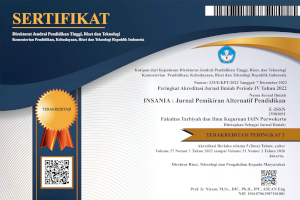Gagasan Konsentrasi Pembidangan Jurusan Pendidikan Agama Islam Fakultas Tarbiyah (By Using Separated-Subject Matter Curriculum Approach) Ahmad Muthohar
DOI:
https://doi.org/10.24090/insania.v16i3.1592Abstract
Abstract: In general, curriculum materials in the fields of PAI includes four categories, namely 1) the materials associated with the al- Quran and al-Hadith, 2) materials relating to faith and morality, 3) material related to fiqh, and 4) materials relating to the history of Islam. The fact shows that the various departments and institutions is not specified into the fields. This paper will outline the concept of specified in PAI Department in accordance with the approach to the majors Separated-Subject Matter Curriculum planning which will result in five divisions material into five PAI study program, those are program of study: 1) Islamic Education (PAI), which prepare students to become a teacher of Islamic religion in school, 2) The course of study the Quran, Hadith, 3) The course of study Aqidah Akhlaq, 4) Fiqh Study Program, and 5) Program Cultural History of Islamic studies which prepare the students to be a teacher at the madrasah. Keywords : Division Concentration, Islamic Religious Education, Separated-Subject Matter Curriculum Approach.Downloads
Downloads
Published
How to Cite
Issue
Section
License
Authors who publish with this journal agree to the following terms:
Authors retain copyright and grant the journal right of first publication with the work simultaneously licensed under a Creative CommonsAttribution-ShareAlike License that allows others to share the work with an acknowledgment of the work's authorship and initial publication in this journal.
Authors are able to enter into separate, additional contractual arrangements for the non-exclusive distribution of the journal's published version of the work (e.g., post it to an institutional repository or publish it in a book), with an acknowledgment of its initial publication in this journal.
Authors are permitted and encouraged to post their work online (e.g., in institutional repositories or on their website) prior to and during the submission process, as it can lead to productive exchanges, as well as earlier and greater citation of published work (See The Effect of Open Access).








